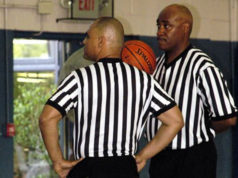Talking to coaches is not an exact science; they are as different as anyone else you would encounter in another forum. What works with one coach may not work with another. Over time, the “book” on the coach will be known and will become a guide in dealing with him or her. Meanwhile, there are certain approaches that have a high degree of success and others that are sure to fail. Here are 4 tips for talking to coaches.
Don’t answer statements.
If it’s not worded as a question, there is a good chance no reply is expected. The coach may merely be venting. Some are just talking to themselves, “thinking out loud.” The context in which statements are made is also important; words can be literal or figurative. Some are clearly figurative statements that are also gallows humor, mere witticisms in the face of a seemingly hopeless situation — the inability to control adverse calls. Any reaction to that type of statement from the bench or dugout will create a problem that doesn’t exist.
“Call it the same both ways,” most frequently heard in basketball games, should also be interpreted as a figurative statement. In one game, the visitors got the jump ball to begin the game and drove for a basket only to be fouled. The home coach immediately blasted out the aforementioned cliché. The official, recognizing the comment as a virtual reflex from an aggrieved coach, calmly approached the bench and said, “Coach, we haven’t even been to the other end yet.”
The phrase is usually spoken out of frustration due to a perceived imbalance in fouls. It can be taken literally as a statement that implies favoritism or cheating, but that’s putting words in the coach’s mouth. One college baseball umpire was quoted as having a planned retort — “If you’re trying to imply I’m making calls for one team, but not the other, you won’t be sitting on the bench much longer.” That is likely to further aggravate the coach (because he didn’t say that), and it’s also a threat.
Another comment that is often spouted is, “That was a bad call.” Everyone is entitled to his or her opinion; ignore it. However, the same comment is often personalized, as in, “You made a bad call.” That’s more direct and meant to be a criticism or an insult. Thick skin is helpful in that case. On the other hand, an official may want to draw a line and make it known that type of comment is unacceptable.
Don’t escalate when talking to coaches.
Sometimes coaches merely want to extract a pound of flesh and don’t expect to affect any change in the officiating. When a coach makes an insulting comment, it’s best to let it roll off your back. Attempting to defuse the atmosphere with words probably isn’t going to work, but pushing back or attempting one-upmanship will only worsen the situation.
Let’s go back to the “bad call” comment. A soccer referee once boasted, “When someone says I’ve made a bad call, I’ll ask, ‘Have I been consistently bad for both teams?’ Or if a coach tells me, ‘You’re the worst referee ever,’ I’ll say, ‘I guess I have to agree with you.’” Not only are rejoinders like that unnecessary, they are likely to be inflammatory. The speaker wanted confrontation and got it. The feeble attempt at humor will almost certainly be viewed as flippancy and now the official is not only bad, he or she is a smart aleck.
Repetitive comments change the landscape. Some coaches have developed the skill to push the envelope to the limit through repeated and voluminous commentary. Each comment is seemingly innocuous and within the limit of the rules, but the incessant barrage eventually creates a distraction. Each official should privately establish his or her own threshold of tolerance. When the limit is reached, a polite warning is issued. If it persists, the appropriate penalty is assessed.
Explain the rule.
The head coach is entitled to an explanation of all unusual rulings or situations. In football, the explanation will normally be given by the wing official, but as necessary, may be given directly by the referee. The legitimacy of the request should be determined by the context under which it is made and not by the tone of the coach’s voice.
Some advocate the use of the phrase “By rule” when making explanations. That certainly is OK, especially during a casual discussion. But in a heated environment, the retort is likely to be, “That’s not the right rule.” Also a snotty inflection on the last two words is not going to help.
In a confrontation, beginning with a rules explanation is not advisable. The first priority is to determine the nature of the debate. In other words, make sure both parties are going to discuss the same issue. Activity in or near the end zone in football or the goal in soccer is difficult to observe from the team bench, as are plays on the opposite sideline in any sport that has a marked court or field. If you cannot agree on what transpired, there is minimal value in explaining the rule. In that case, you might try, “Well, if it happened the way you said it did, you are correct.”
Watch your tone.
Your tone of voice when talking to coaches is such an important part of communication that it may often override the actual words you’re using. Tone of voice is basically defined as the quality of a person’s voice. Those qualities are made of the pitch, characteristics and volume of the voice. The choice of words, the way they are delivered and the manner of speaking also make up the tone.
Whether you realize it or not, people develop much of their perception of you based on your tone of voice. Your tone reflects your attitude toward the audience. If your tone is clear, strong and full of exuberance, they may think you’re confident. People who speak haltingly or at a low volume may be considered weak, timid or just plain afraid. If your voice carries an angry tone, the response is likely to be in kind.
Your voice probably stays the same from day to day. But your tone of voice changes all the time, whether you notice it or not. Tone of voice plays a major role in getting a message across and you need to think about it before you speak.
What's Your Call? Leave a Comment:
Note: This article is archival in nature. Rules, interpretations, mechanics, philosophies and other information may or may not be correct for the current year.
This article is the copyright of ©Referee Enterprises, Inc., and may not be republished in whole or in part online, in print or in any capacity without expressed written permission from Referee. The article is made available for educational use by individuals.
















